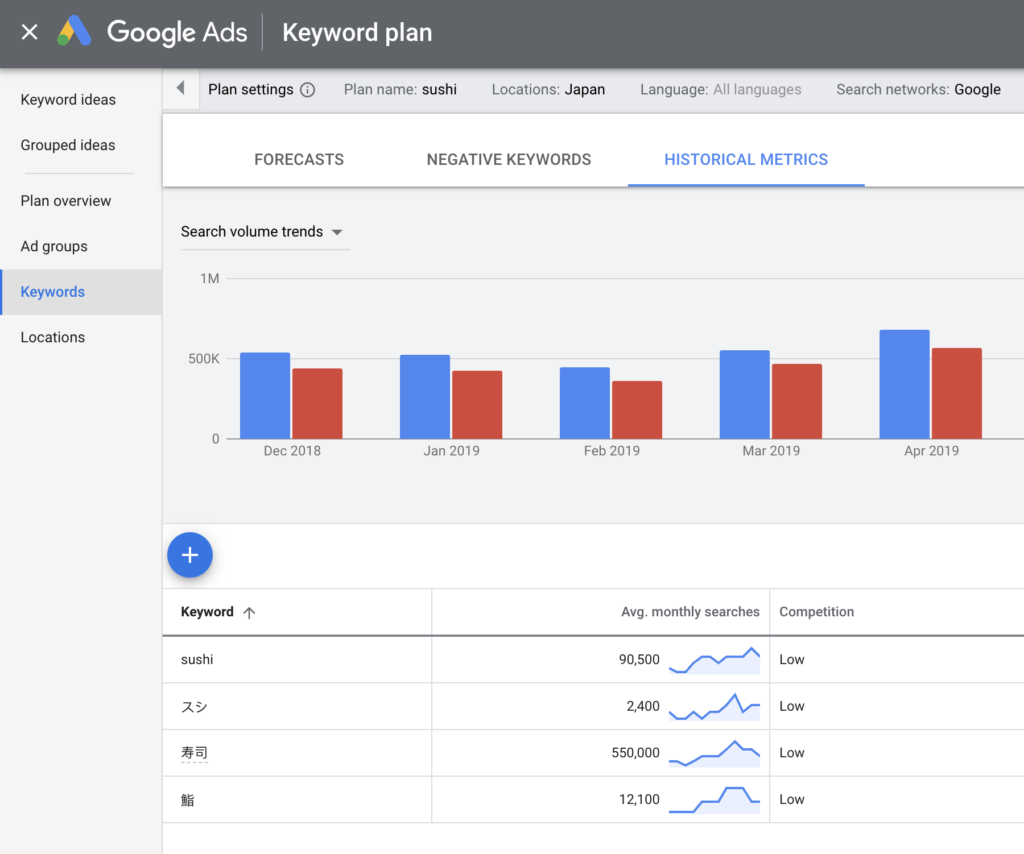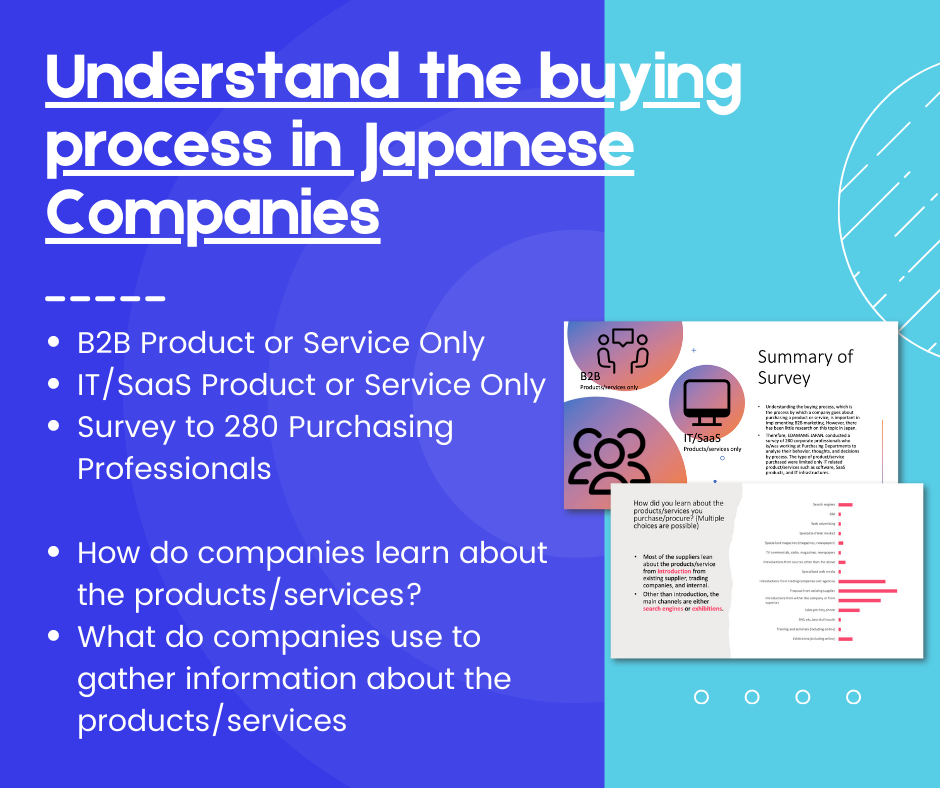Japan SEO Practices | 9 Differences and Country-specific Tips

We all know that SEO is one of the most fundamental and important roles in web marketing and driving traffic to your site. So as Japan SEO.
Since many Internet users use search engines on a daily basis, attracting customers from search engines has become a must incorporate marketing activities.
Of course, this trend is the same in Japan. However, due to the characteristic language of Japanese, best SEO practices may differ slightly.
- Japan SEO 9 Differences and Tips
- Keywords: Do not just translate
- Word Count: Longer is better but depends on contents
- Title and Meta Description for Japan SEO
- Contents: Absolutely No Google Translation
- Search Engines: Google and Yahoo! JAPAN
- Domain or Slug is Japanese characters: not recommended
- ccTLD in Japan SEO: Use “.jp”
- Location of the hosting server: Use Japanese Server
- Geo-targeting with Google Search Console
- Japan SEO Conclusion
Japan SEO 9 Differences and Tips
Keywords: Do not just translate
One of the tasks that must be performed when performing Japanese SEO is “keyword selection” in Japanese.
SEO is a method of reaching users who actually search, so it is impossible to reach users without the right keywords, and direct translation in English is meaningless.
In particular, Japanese is special, and even though words have the same meaning, there are many cases where there are various notations such as kanji, hiragana, katakana, and the alphabet.
For example, for the keyword “sushi” has below ways of writing;
“すし (sushi)”, ”スシ (sushi), “寿司 (sushi)”, “鮨 (sushi)”, “寿し (sushi)” and of course “Sushi”
There are various ways of writing even if they have the same meaning and totally difference average search volumes.

Since the average number of searches for each is different as shown below, it is important to use a keyword tool, Google Trends, etc., to match the most searched expressions.
Word Count: Longer is better but depends on contents
Regarding the number of characters, as in overseas SEO, “depending on the content” is considered the most accurate answer. This means that content that meets user needs is ideal, and there is no direct relationship between character count and SEO.
However, if you look at the actual top-ranked pages, you can see that the average number of Japanese characters is about 4,000 to 5,000, although there was some variation depending on the keywords.
This translates to about 1,600 to 2,000 words in English.
Of course, the number of characters is important, but writing irreverent and meaninglessly long articles to be evaluated by search engines has fallen out of the fundamental intent of delivering articles. If you are forced to lengthen and make it difficult to read or put duplicate text, an article that is concise and easy to understand will be a better article from the user’s point of view.
In addition, it is possible to be rank higher even with short articles if you pay attention to the frequency of keywords, placement of internal and external links, tagging, etc.
Furthermore, if the article is readable and compelling to share in social media, the ranking will increase regardless of the length of the sentence.
Title and Meta Description for Japan SEO
The user clicks on the page title or the page summary text in search results.
The title of the page is often the title tag, and the meta description of the page is often the meta description tag, so make sure to carefully examine the contents of these two tags.
The length of each is mainly determined by the number of pixels, but here are some common practices in Japanese characters:
title tag
The number of characters displayed in the search results is 30 to 40 characters, so make sure to write sentences that can accurately convey the contents of the page.
meta description tag
About 140 characters are displayed in search results on PC, and about 80 characters on mobile. Information that is appealing to users, such as free shipping, can be displayed in mobile search results by writing in the first half.
Alternatively, you could check your pixels using free tools like below.
Google Meta Title & Description Length Preview Tool Measures in Pixels
Contents: Absolutely No Google Translation
Do not use machine translation when creating a Japanese language page based on a page created in English. Translations made by machine translation looked very “translated”, resulting in unnatural and strange sentences.
If the meaning is not communicated to local people, it will not be recognized as good content, and will not be evaluated by search engines. When translating, you must do a human translation, not a machine translation.
Search Engines: Google and Yahoo! JAPAN
Search engines used in Japan include Bole, Infoseek, and goo, developed by Microsoft, as well as the most famous Goole and Yahoo! JAPAN.
In most case, you only have to care about Google and Yahoo! JAPAN. However, Yahoo! uses Google as it is as inside the search service.
Therefore, even if you want to take SEO measures for Yahoo!, you need to take the same measures as SEO for Google. In other words, if you are optimizing japan SEO for Google, you will also be able to improve your rankings for Yahoo!
Read more about the Japanese search engine here.
Domain or Slug is Japanese characters: not recommended
URLs can include Japanese as well as English.
For example, even on this site below, Japanese is used like this on the URL can be used and accessible.
How is a Japanese URL actually SEO? Google Webmaster Trend Analyst John Mueller answered this in the SEO snippets video.
In conclusion, the fact that the URL of the Japanese homepage contains Japanese characters is no problem for SEO, and Google can crawl, index and rank the homepage.
Conversely, at the moment, the Japanese characters do not seem to be advantageous in terms of SEO, so it seems that it is not enough to change the current URL.
However, when you copy and paste URLs containing Japanese characters, the type of encoding called percent-encoding is performed.
For example, if you copy and paste the above URL, it will be a long and incomprehensible URL as shown below.
http://xn--eckwd4c7c5976acvb2w6i.com/For this reason, it is often the case that the site link becomes longer when sharing it, increases the risk of mistakes in copy and paste, lost its meaning, and depending on the service used, the link is automatically converted and the link can not be clicked.
We do not recommend Japanese character URLs for the above reasons.
ccTLD in Japan SEO: Use “.jp”
As you know, there are various types of TLDs, but the search rank does not change depending on the TLD used.
However, since ccTLDs assigned by country such as “.jp” are referred to as one of the information used by Google to determine the nationality of the site, it is safer to avoid non-Japanese ccTLDs that might mislead Google. Therefore, if your target is Japanese, it is better to use the .jp domain.
For other detail ccTLDs domain category in Japan please see below.
Location of the hosting server: Use Japanese Server
The server location is the country where the server is located. And the location (country) where the server is located can be determined from the IP address.
According to the article of Official Google Webmaster Central, Google’s server location also seems to affect search results.
Server location, cross-linking, and Web 2.0 technology thoughts
“Google considers both the IP address and the top-level domain (e.g. .com, .co.uk).… We often use the web server ’s IP address as an added hint in our understanding of content.”
If you are targeting Japanese, it is better to use a server or rental hosting server located in Japan.
Alternatively, build a site using AWS, which is basically used in many areas.
Geo-targeting with Google Search Console
If the acquired domain is a generic top-level domain (com, info, net, etc.) instead of a country code top-level domain, you need to use the Google Search Console for geo-targeting. Use the “Country targeting tool” in the Google Search Console to tell search engines where you are targeting.
Japan SEO Conclusion
Due to differences in search language and trends in popular content between Japan and overseas, the japan SEO slightly differs from overseas SEO and unique.
Here are 9 short tips and differences that you might want to do differently if you are doing SEO for Japanese targets.
- Do not just translate keywords
- Minimum 4,000 to 5,000 Japanese words in the contents
- Max 40 Japanese words in tile, and max 80 Japanese words in meta-description
- Use human translation for contents
- Optimize for Google and Yahoo! JAPAN
- No Japanese character domain or slug
- Use “.jp” domain for ccTLD
- Use a hosting server located in Japan
- Geo-targeting in Google Search Console
About us and this blog
We are a digital marketing company with a focus on helping our customers achieve great results across several key areas.











